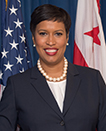Washington, DC
Mayor Bowser Announces Over $16 Million in Financial Assistance to Sustain DC’s Child Care Sector
(Washington, DC) – Today, Mayor Muriel Bowser announced new emergency funding to support licensed child care providers in Washington, DC and help them stay in business through the coronavirus (COVID-19) public health emergency. The District is allocating $10.7 million for a new grant program to deliver financial relief to licensed child care facilities and creating a $3 million fund for targeted assistance to providers affected by the public health emergency. In addition, the previously announced DC Road to Recovery Fund has been expanded from $2.8 million to $5.8 million, enabling that program to fund grants to all eligible applicants. Combined with the $5 million in DC Child Care Relief Fund grants made to 90% of child care providers in the fall of 2020, these programs will result in more than $24 million in direct financial assistance to District child care providers during the public health emergency.
“We know why child care is critical: it helps give our young people the strong start they deserve, and it ensures working families have the supports they need to succeed,” said Mayor Bowser. “With these investments, we remain committed to providing our child care providers with the robust relief they need to stay in business, serve families, and make it to the other side of this pandemic.”
Funding for the newly announced grant programs comes from local funds and the federal Coronavirus Relief and Recovery Supplemental Appropriations Act (CRRSA), which provided the District $16.6 million in funding for child care. In addition to those funds, Mayor Bowser is dedicating all of the $2.5 million in Governor’s Emergency Education Relief (GEER) Funds the District received through CRRSA to provide additional financial assistance to child care providers.
“We are extremely grateful to Mayor Bowser for prioritizing the child care sector by dedicating GEER funds and directing additional local and federal dollars to support continued operations of child care providers during the public health emergency,” said Interim State Superintendent Shana Young. “This decision demonstrates the Bowser Administration’s understanding that child care is a crucial component of our District’s education system, along with K-12 schools and higher education, that deserves ongoing public support. Along with other strategies we have put in place during the public health emergency, including the Public Health Emergency subsidy rate that increases payments to subsidy providers, these funds will help ensure that child care providers can continue their crucial work supporting families and preparing children to succeed in school.”
The Office of the State Superintendent of Education (OSSE) will administer the new grant programs through partnerships with the Washington Area Community Investment Fund (Wacif) and the Low-Income Investment Fund (LIIF), which have previously partnered with the District to provide grants and technical assistance to child care providers. Additional details and grant applications will be available from Wacif and LIIF later in the spring.
In addition to direct financial assistance to sustain the child care sector, the District will use CRRSA funds to provide technical assistance and system-level supports to help child care providers continue to meet additional health and safety requirements, strengthen the sustainability of the child care sector, and help families return to child care as the District’s economy continues its recovery. These supports will include:
Provision of deep cleaning services to eligible child care providers;
- Expansion of the District’s Shared Services Business Alliance, which provides back office support to smaller child care centers and homes to help them strengthen business practices and benefit from economies of scale;
- Business technical assistance for child care providers available through OSSE grantees, Wacif, and LIIF;
- Supports for children’s social-emotional learning and mental health for children, families, and child care staff; and
- Enhancement of the District’s Child Care Resource and Referral services to help families find child care as they return to in-person work.

